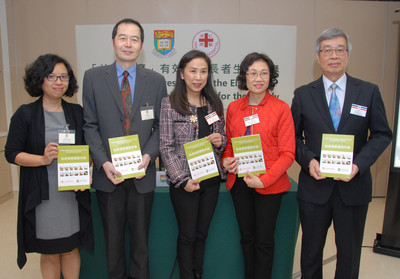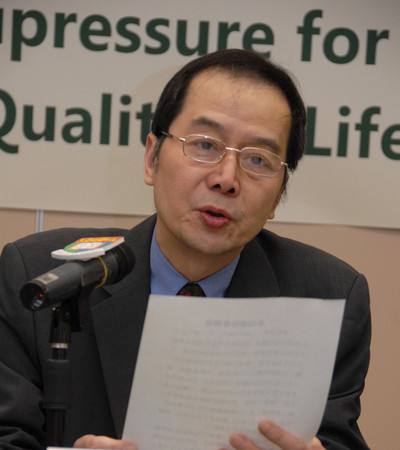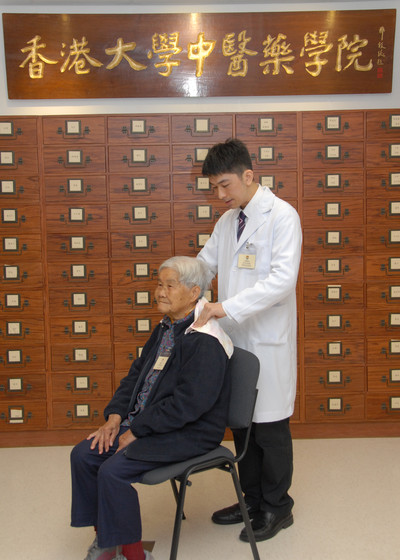“Comfy Acupressure for the Elderly” Improves the Quality of Life for the Elderly
30 Mar 2016
A recent clinical study conducted by the School of Chinese Medicine, Li Ka Shing Faculty of Medicine, The University of Hong Kong (HKU) in collaboration with Yan Chai Hospital Social Services Department (YCHSS) finds that “Comfy Acupressure for the Elderly” can effectively improve the quality of life of frail elderly and reduce the strain of their caregivers. Acupressure reduces the pain intensity and frequency of frail elders, it also improves their sleep quality, which make them feel happier after receiving the treatment. As the acupressure protocol is easy to learn and apply in daily life, HKU and YCHSS are planning to further promote it in the community in order to benefit the frail elderly as well as their caregivers.
Comfy Acupressure for the Elderly
It is common for frail elderly to have chronic diseases, such as high blood pressure, heart disease, insomnia, dizziness, headache, and stiffness and pain of joints, which severely affect the health condition and quality of life of the elderly. As the ageing population grows, the increase in frail elderly will pose immense pressure on Hong Kong’s healthcare system.
“Comfy Acupressure for the Elderly” is developed on the basis of Traditional Chinese Medicine (TCM) theory and practice, with an aim to improve the quality of life or even prevent the progressive advancement of frailty among the frail elderly. It has 12 steps and mainly concentrates on the acu-points on face, head, neck and shoulder. This 15-minute treatment protocol is designed to be operated by informal caregivers after proper training; all chosen acu-points are easy to locate and all techniques that demand professional training or involve potential risks (e.g. joint mobilisation) are excluded from the protocol.
Research design and findings
From November 2014 to March 2016, two researches were conducted in the elderly centres and care and attention homes run by YCHSS. 79 pairs of qualified frail elders with the mean age of 76 and their caregivers in elderly centres and 56 qualified frail elders with the mean age of 83 in care and attention homes completed the studies respectively. The frail elders received 4 acupressure treatments a week for 12 weeks, twice from a registered Chinese Medicine Practitioner and twice from a designated informal caregiver. The participants’ conditions were measured before intervention, after intervention and at 3 months after intervention.
The research finds that “Comfy Acupressure for the Elderly” protocol significantly improved the general quality of life of the frail elders in physical, social relationship and environment domains. The frail elders had 15% and 30% improvements in physical domain and physical-pain induced constraints in the community respectively. There was 8% increase in their satisfaction in the ability to perform daily living activities. The participants in the community also benefited from a better mood after treatment. 42% of the elder-caregivers in the community were spouses of the frail elders who were of a similar age and were in stress as they have to take care of the frail elders. The research finds that the caregivers’ strain and stress level had significantly reduced by over 20% after treatment.
The frail elders in residential care setting enjoyed a significant improvement in the quality of sleep and they were also much happier after treatment. The acupressure protocol reduced physical limitations, enhanced vitality and improved social functioning of the frail elders in care and attention homes.
Significance and implications of the study
The research discovered that applying acupressure on the head and shoulder area with specific technique can significantly improve the blood circulation, brighten the senses, relieve tension, lower blood pressure, improve insomnia and reduce pain of frail elders. Dr Li Lei, Associate Professor of School of Chinese Medicine, Li Ka Shing Faculty of Medicine, HKU says, “‘Comfy Acupressure for the Elderly’ can improve the blood circulation, brighten the senses and release the stress of the frail elderly, and therefore improve their psychological well-being. The elderly can therefore perform better in daily living activities and lead a better social life. ‘Comfy Acupressure for the Elderly’ is a 12-step acupressure protocol which is easy to learn and safe to use, and it provides a viable non-pharmacological treatment for frail elderly with chronic diseases.”
It is recommended to promote “Comfy Acupressure for the Elderly” protocol as a complimentary treatment to the frail elders in the community through providing training and support to their caregivers. The service providers of residential care can also consider integrating the therapy to the care plan for the frail elders, especially for those who suffer from deprived sleep quality.
Mr Lai Kwok-wing, General Manager (Social Services) of YCHSS, adds, “We thank very much for the funding from the Social Welfare Development Fund, without this fund, such a meaningful research could not be carried out. In order to share the Comfy Acupressure with our counterparts, we are planning to launch training courses on Comfy Acupressure for the general public while the training manual with DVD will be distributed free-of-charge starting from April 18.” Informal caregivers are an important source of manpower to provide long-term care to the frail elderly in the community dwellings. The elderly centres in the community could play an active role in identifying, training and supporting these potential elder-caregivers. Collaborating with other health professionals, the elderly centres could also serve as a hub to provide integrative care for the frail elderly in their neighbourhood.
About the research team and YCHSS
The research was initiated by YCHSS and led by Dr Li Lei, Associate Professor of School of Chinese Medicine, Li Ka Shing Faculty of Medicine, HKU. Since 2004, YCHSS has been focusing on improving the quality of life of their elderly service recipients through non-invasive therapies, such as adopting Mahjong, Cantonese opera, Tai Chi and Qi-gong in their services.
To use the press release photo(s) for any publishing, publicity and related purpose, photo courtesy should be given to “Li Ka Shing Faculty of Medicine, The University of Hong Kong”

(From left) Ms Clara Chan Wai-chung, PhD Student of School of Chinese Medicine, Li Ka Shing Faculty of Medicine, HKU, Registered Chinese Medicine Practitioner, Dr Li Lei, Associate Professor of School of Chinese Medicine, Li Ka Shing Faculty of Medicine, HKU, Mrs Yim Tsui Yuk-shan, Chairman of Social Services Committee, Board of Directors, Yan Chai Hospital, Mrs Mary Suen, Director of Yan Chai Hospital Board and Mr Lai Kwok-wing, General Manager (Social Services) of Yan Chai Hospital Social Services Department took a group photo at the press conference.

Dr Li Lei, Associate Professor of School of Chinese Medicine, Li Ka Shing Faculty of Medicine, HKU, points out that “Comfy Acupressure for the Elderly” can significantly improve physical domain and quality of sleep of frail elders, as well as their psychological well-being. It is therefore recommended to promote “Comfy Acupressure for the Elderly” as a complimentary treatment to the frail elders in the community.

Ms Leung Ho, aged 86, benefits from the “Comfy Acupressure for the Elderly”, an easy-to-learn and safe-to-use acupressure protocol which provides a viable non-pharmacological treatment for frail elderly with chronic diseases.
